
The United States continues to support Israel in its war against Hamas, but relations appear increasingly strained between the two countries and their leaders. The war also seems to have affected public opinion in both countries: Americans and Israelis now see one another’s leaders more negatively than in the recent past, and other key views have shifted as well.
Below, we explore American and Israeli public opinion in detail. This analysis is based on two Pew Research Center surveys of U.S. adults – one conducted in February and one in early April – as well as a survey of Israeli adults conducted in March and early April.
Pew Research Center analyzed Americans’ and Israelis’ attitudes on a variety of questions related to the Israel-Hamas war. The recent U.S. data is from two polls: a survey of 12,693 U.S. adults conducted Feb. 13-25, 2024, and a survey of 3,600 U.S. adults conducted April 1-7, 2024. The data for Israel is from a survey of 1,001 Israeli adults conducted March 3-April 4, 2024.
Most of the respondents in the February survey of U.S. adults (10,642) are members of the Center’s American Trends Panel (ATP). The ATP is an online survey panel that is recruited through national, random sampling of residential addresses, which gives nearly all U.S. adults a chance of selection. Read more about the ATP’s methodology.
The remaining 2,051 respondents are members of three other survey panels – Ipsos’ KnowledgePanel, SSRS’s Opinion Panel, and NORC at the University of Chicago’s AmeriSpeak Panel – who were interviewed because they identify as Jewish or Muslim.
The February survey “oversampled” (i.e., interviewed a disproportionately large number of) Jews and Muslims to provide more reliable estimates of their views. But these groups are not overrepresented in the national figures reported, because we adjusted for the oversampling in the weighting of the data.
Although the February survey included questions about where U.S. adults were born and whether they identify as Arab or of Arab origin, there was insufficient sample size to analyze Arab Americans or people of Palestinian descent separately. In that survey, only about a quarter of U.S. Muslims identified as Arab or of Arab ancestry. As a result, in our U.S. analysis, we describe differences between religious groups, rather than differences in opinion between Arab Americans and Jewish Americans. In contrast, our surveys in Israel have sufficient samples to allow comparisons between Israeli Arabs and Israeli Jews.
Both U.S. surveys are weighted to be representative of the U.S. adult population by gender, race, ethnicity, partisan affiliation, education, religious affiliation and other categories.
The survey of Israeli adults was conducted face-to-face. Interviews were conducted in Hebrew and Arabic, and the survey is representative of the adult population ages 18 and older, excluding those in East Jerusalem and non-sanctioned outposts. (The survey also does not include the West Bank or Gaza.) The survey included an oversample of Arabs in Israel. It was subsequently weighted to be representative of the Israeli adult population with the following variables: gender by ethnicity, age by ethnicity, education, region, urbanicity and probability of selection of respondent.
Here are the February and April questions and responses for the United States used for this analysis, and the questions and responses for Israel. Here are the February and April survey methodologies for the U.S., and the survey methodology for Israel.
Americans have less confidence in Israeli Prime Minister Benjamin Netanyahu than Israelis have in U.S. President Joe Biden. Only 30% of U.S. adults express some or a lot of confidence in Netanyahu, while around half (53%) have not too much or no confidence in him. An additional 15% say they have not heard of him.
By contrast, more than half of Israeli adults (57%) have some or a great deal of confidence in Biden to do the right thing regarding world affairs, whereas 42% have little or no confidence in him.
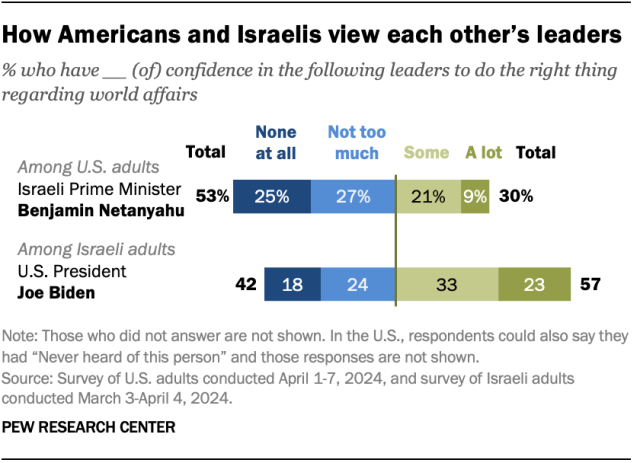
Americans’ views of Netanyahu have turned more negative over the past year. The share of Americans with little or no confidence in Netanyahu to do the right thing regarding world affairs is up 11 percentage points since March 2023 (42% then, 53% today).
Democrats are more likely than Republicans to have a negative view of Netanyahu. Approximately seven-in-ten Democrats and Democratic-leaning independents (71%) have little or no confidence in him, up from 56% in 2023. Around a third of Republicans and GOP leaners (34%) now take this view – up from 29% in 2023.
Related: A growing share of Americans have little or no confidence in Netanyahu
Israelis’ opinions of Biden have also turned more negative. While 57% of Israelis express a lot or some confidence in Biden, that’s down from 68% last year. The share of Israelis who have no confidence at all in Biden has doubled, from 9% to 18%.
Israeli Jews and Arabs differ widely in their views of the U.S. president: 66% of Jews have confidence in Biden, but only 21% of Arabs agree. Among both groups, overall confidence in Biden has decreased by 10 points since last year.
Older Israelis, as well as those in the ideological center or on the right, have more confidence in Biden than younger and left-leaning Israelis do.
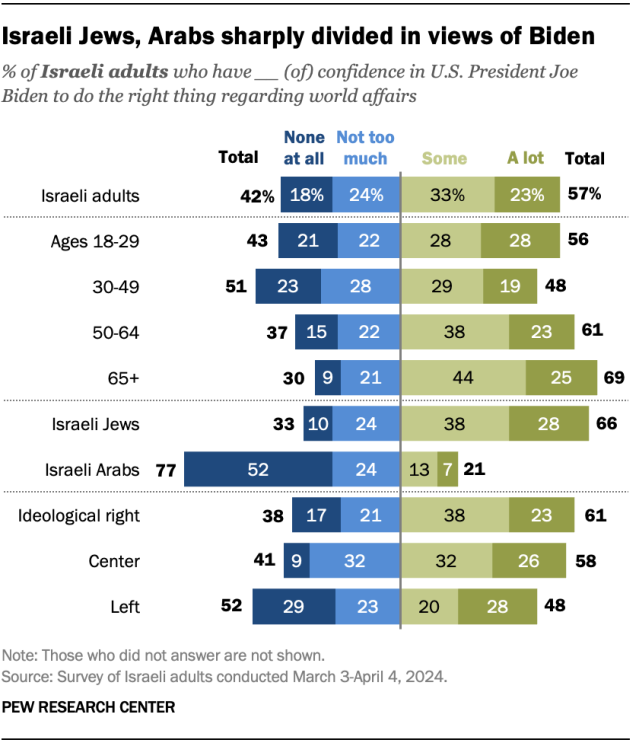
The share of Israelis with a favorable opinion of the U.S. has declined. While a broad majority of Israelis (77%) continue to see the U.S. favorably, this is down 10 points since last year. This marks the lowest overall rating of the U.S. in Israeli public opinion since 2011, based on our nearly two-decade trend.
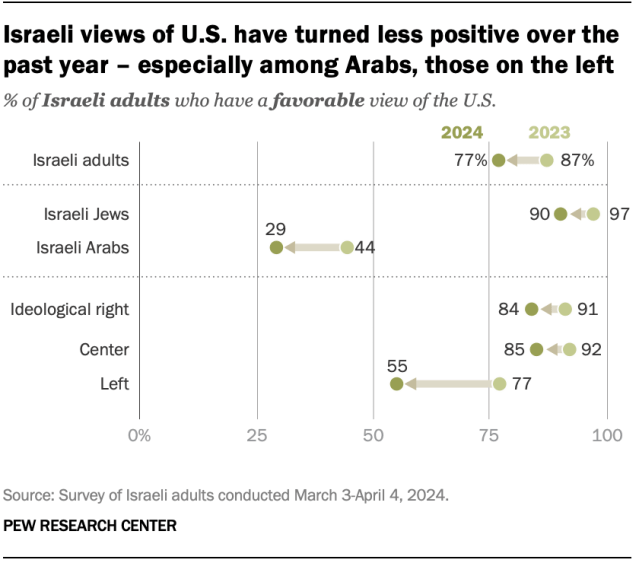
Views of the U.S. are significantly more positive among Jewish Israelis (90%) than Arab Israelis (29%). They are also much more positive among Israelis who place themselves on the ideological right (85%) or in the center (84%) than on the left (55%).
Since last year, views of the U.S. have soured among most demographic groups in Israel, but particularly among Arab Israelis and people on the ideological left.
Americans’ views of the Israeli people are broadly positive, but far fewer express favorable views of the Israeli government. In our recent U.S. polling, we have asked separately about views of the Israeli government and the Israeli people, rather than ask a single question about views of Israel. (Past research suggests that views of the country tend to fall somewhere between views of its people and its government.)
In our survey this past February, 64% of Americans had a favorable view of the Israeli people, while 41% voiced a favorable view of the Israeli government. Both of these figures were down modestly from 2022. Views of the Israeli people have ticked downward more among younger Americans than among older ones.
Americans and Israelis alike are divided over whether Biden is favoring one side too much in the Israel-Hamas war. In our February survey, Americans were about evenly split as to whether Biden was favoring the Israelis too much (22%), favoring the Palestinians too much (16%) or striking the right balance (21%). However, the largest share of all – 40% – was not sure.
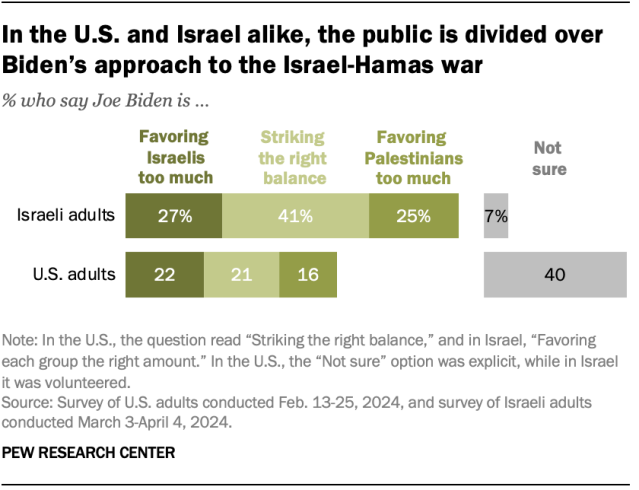
In Israel, 41% of adults say Biden is striking the right balance, but nearly equal shares say the U.S. president favors the Israelis too much (27%) or favors Palestinians too much (25%). Just 7% of Israelis aren’t sure or did not answer the question. (It’s important to note that U.S. respondents took the survey online and were given an explicit “Don’t know” option. Israeli respondents, interviewed in person, were not. Previous research shows that offering an explicit “Don’t know” option in online surveys is a better comparison with face-to-face survey data.)
In both the U.S. and Israel, people on the ideological left are more likely than those on the right to say Biden is favoring Israelis too much (in the U.S., ideology was measured as liberal, moderate and conservative).
In the U.S., Muslim Americans are far more likely than Jewish Americans to say Biden favors the Israelis too much (60% vs. 13%). In Israel, Arabs (86%) are much more likely than Jews to say the same (86% vs. 11%). (In the U.S., we “oversampled” Muslim and Jewish Americans but did not have sufficient sample size to analyze Arab Americans. For more details on the sampling, read the “How we did this” box.)
Around seven-in-ten Israelis (72%) want to see the U.S. play a major diplomatic role in resolving the Israel-Hamas war, but Americans are more divided. In the U.S., a majority of Americans (55%) also say the U.S. should play a role in ending the war, but more favor a minor role than a major one (35% vs. 20%). Another 27% want the U.S. to play no role at all – a view shared by only 10% of Israelis.
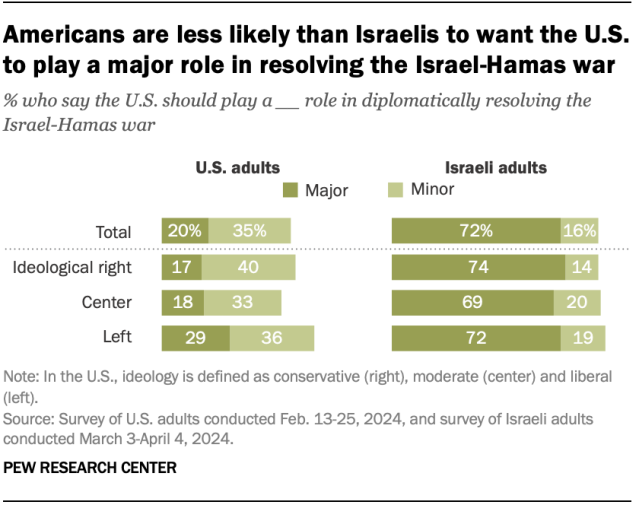
Americans on the ideological left are more supportive of the U.S. playing a major role than are those in the center or on the right. In Israel, U.S. involvement is broadly popular across the ideological spectrum.
In the U.S., 45% of Jews think the U.S. should play a major role in resolving the war, compared with 27% of Muslims. In Israel, Jews and Arabs are both generally supportive of the U.S. playing a major role (74% and 62%, respectively).
Note: Here are the February and April questions and responses for the United States used for this analysis, and the questions and responses for Israel. Here are the February and April survey methodologies for the U.S., and the survey methodology for Israel.
